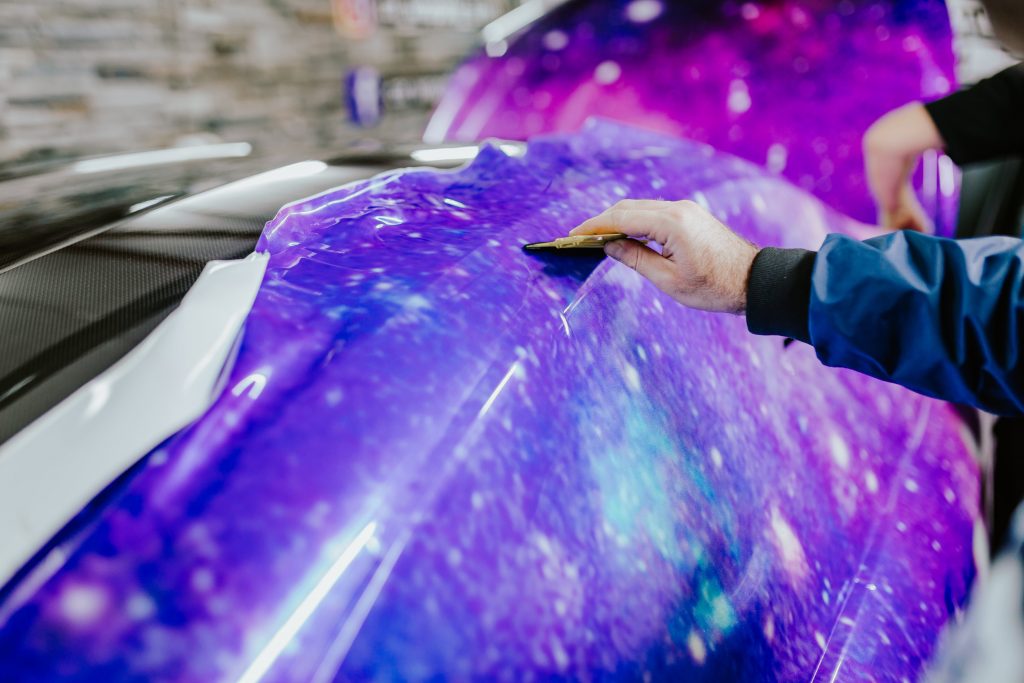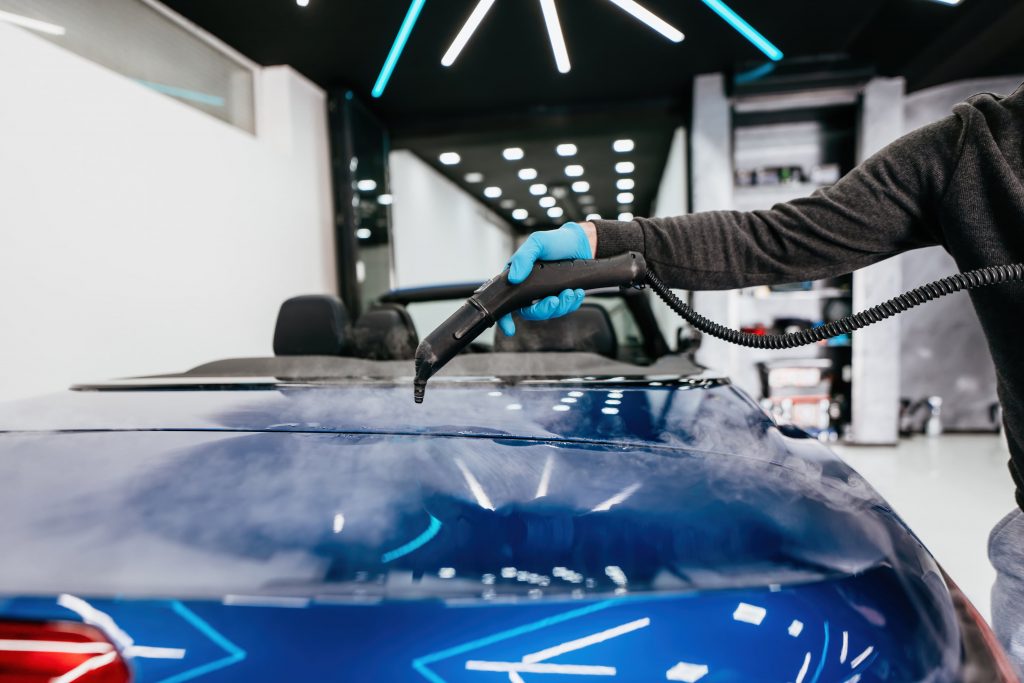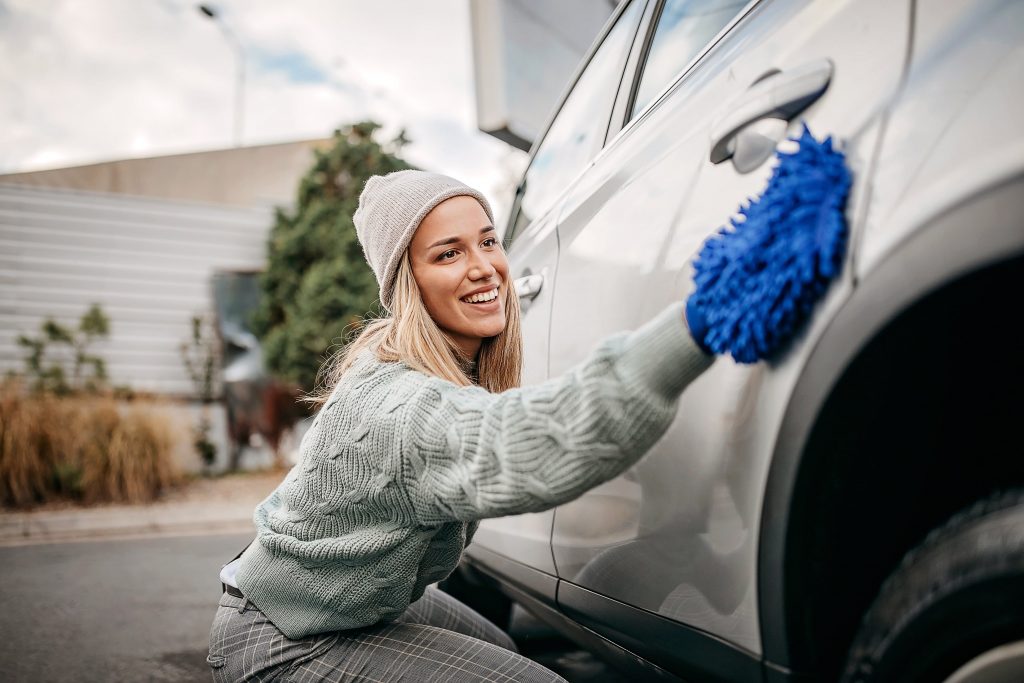Vehicle wraps offer a dynamic way to brand your business, protect your vehicle, and make a statement on the road. But to ensure that your investment reaps lasting benefits, understanding and implementing proper care and maintenance is crucial. In normal circumstances, a vehicle wrap will last from 3-5 years, but there are factors that could both shorten and extend this lifespan.
The way you use your vehicle plays a significant role in the longevity of the wrap. Vehicles with lighter use tend to maintain their wraps in good condition for a longer period. Conversely, those subjected to frequent or intense use, especially in challenging environments, may see a reduced lifespan of the wrap.
At Tailor Made, we understand the importance of maintaining the wrap on your car, whether you have it for personal aesthetics, or as a way to advertise your business. We are experts when it comes to design and signage services, including high-quality car wrapping in Northampton, Banbury, Kettering, and Coventry. To make sure you make the most of your money and have the knowledge required to keep your car wrap in excellent condition for as long as possible, our team has put together everything you need to know about maintaining your vehicle wraps!
What Are Vehicle Wraps Made From?
There are a range of different materials to choose from when it comes to car wrapping, and each is created with durability, flexibility, and visual appeal in mind. It’s important to consider which material you prefer when designing your wrap, which includes the effect you are trying to achieve. Some common vehicle wrap materials include:
Vinyl: The most common material for car wraps, vinyl is favoured for its durability and flexibility. It comes in various forms, including:
- Cast Vinyl: Known for its high quality, cast vinyl is thin and conforms easily to the vehicle’s contours, making it ideal for complex surfaces. It’s more durable and less prone to shrinkage compared to other types.
- Calendered Vinyl: Thicker and less expensive than cast vinyl, calendered vinyl is suitable for flat surfaces and shorter-term applications. It’s less comfortable and durable compared to cast vinyl.
Overlaminate: This is a clear layer applied over the vinyl to protect the printed design from UV rays, scratches, and abrasions, thereby extending the wrap’s life. Overlaminates can be glossy, matte, or textured, depending on the desired finish.
Adhesive: High-quality, pressure-sensitive adhesives are used to ensure the vinyl adheres firmly to the vehicle’s surface. These adhesives are designed to be removable without damaging the vehicle’s paint.
Ink: For printed wraps, solvent, eco-solvent, latex, or UV-curable inks are used. These inks are chosen for their ability to bond with the vinyl and for their colour longevity.
Specialty Materials: For unique effects, materials like chrome, carbon fibre, metallic, matte, and pearlescent finishes are also used. These specialty materials offer distinctive looks but may differ in durability and application techniques compared to standard vinyl.
By combining these materials, car wraps can be customised to achieve a wide range of aesthetics while ensuring durability and protection for the vehicle’s original paintwork.
Understanding the Lifespan of a Vehicle Wrap
A vehicle wrap’s longevity hinges on several factors: the quality of the vinyl, the precision of the installation process, and the conditions under which the vehicle is used. Typically, a vehicle wrap lasts between two to seven years. High-quality materials and lighter usage can extend this duration, while exposure to harsh elements and heavy use might shorten it.
Additionally, the design and colour of the vehicle wrap can influence its lifespan. Darker colours and more complex designs may show signs of wear and fading more quickly than lighter, simpler designs, especially when exposed to prolonged sunlight and environmental elements. The type of wrap – whether full, partial, or using specialty materials – also plays a role in its durability. Full wraps provide more comprehensive coverage and protection, potentially lasting longer, while partial wraps or those with specialty finishes might have different wear characteristics. Regular inspections and prompt repairs to any damage, like peeling or lifting edges, are crucial in extending the wrap’s life and maintaining its visual impact.
Essential Maintenance for Prolonged Durability
To ensure your vehicle wrap remains vibrant and durable over time, it’s essential to adhere to a maintenance routine that protects and preserves the material. Each of these steps is crucial to maintain the wrap’s aesthetic appeal and longevity:
Regular Cleaning
Consistent cleaning is key in prolonging the life of your vehicle wrap. Dirt, road grime, and environmental pollutants can cause premature wear and tear. Regular cleaning not only keeps the wrap looking fresh but also protects it from potential damage.
Cleaning Recommendations:
- Frequency: Wash the wrap at regular intervals, depending on usage and exposure to dirt.
- Method: Hand washing is preferable to automated washes to reduce the risk of damage.
- Tools: Use soft, non-abrasive cloths or sponges to prevent scratching the surface.
A clean vehicle wrap not only looks professional but also extends its lifespan, making regular cleaning an investment in both aesthetics and durability.
Choosing the Right Cleaning Agents
The choice of cleaning agents is critical in maintaining the integrity of your vehicle wrap. The wrong chemicals can damage the vinyl, leading to fading and peeling.
Guidelines for Selecting Cleaning Agents:
- Type: Opt for mild automotive detergents designed for use on vehicle wraps.
- Avoid Harsh Chemicals: Steer clear of abrasive cleaners, solvents, or oil-based cleaning products.
By choosing the right cleaning agents, you ensure that the wrap retains its colour and adhesion, contributing to its overall lifespan and appearance.
Hand-Washing Technique
Handwashing is the safest and most effective way to clean your vehicle wrap. It allows for gentle yet thorough cleaning, ensuring that every part of the wrap is properly maintained.
Step-by-Step Hand-Washing Guide:
- Rinse: Start by rinsing the vehicle with water to remove loose dirt and grit.
- Wash: Use a soft, clean cloth or sponge with a non-abrasive detergent. Clean the wrap using a gentle circular motion.
- Rinse Again: After washing, rinse the vehicle thoroughly to remove any soap residue.
Adopting a careful hand washing technique will not only keep your vehicle wrap clean but also prevent potential damage that can occur with more aggressive cleaning methods.
By following these essential maintenance techniques, you can significantly extend the life and vibrancy of your vehicle wrap, ensuring it continues to serve as a dynamic marketing tool and protective cover for your vehicle.
Additional Tips for Wrap Care
When caring for your vehicle wrap, there are several additional measures you can take to extend its life and maintain its visual appeal. One crucial aspect is to minimise exposure to harsh environments. Constant exposure to extreme weather, such as intense sunlight, heavy rain, or snow, can accelerate the degradation of the wrap. To mitigate this, try to park your vehicle in shaded or covered areas as much as possible. This helps protect the wrap from the damaging effects of the weather and maintains its colour and integrity for a longer period.
Another effective strategy for preserving your vehicle wrap is the use of sealants. After cleaning the wrap, applying a high-quality wrap sealant can add an extra layer of protection. This not only enhances the wrap’s appearance, making it look newer for longer, but also contributes to its overall lifespan by providing a barrier against environmental elements and potential contaminants.
Lastly, the importance of professional installation and timely repairs cannot be overstated. A vehicle wrap needs to be installed meticulously to avoid issues like peeling and bubbling, which can significantly shorten its lifespan. If you notice any damage to your wrap, it’s important to have it repaired as soon as possible by a professional. This ensures that minor issues don’t escalate into major problems, keeping your wrap in pristine condition for as long as possible.
For More Information, Contact Tailor Made Today!
If you would like to know more, or to speak with a professional to discuss getting your own vehicle wrap, please don’t hesitate to get in touch with the team at Tailor Made! We have been offering quality car wrapping services throughout Northampton, Kettering, Banbury, Coventry, and more for many years now, and we’re experts at what we do!
Don’t settle for subpar quality when you can achieve a stunning vehicle wrap at an affordable price from Tailor Made!


